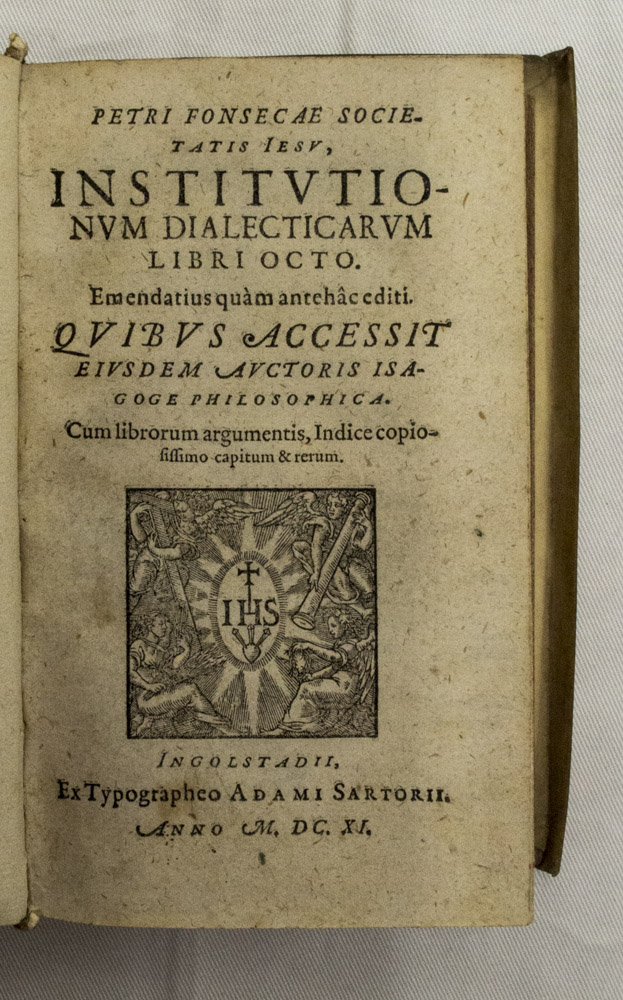OK
OK Cancel


FONSECA, PEDRO DA (PETRUS FONSECA)
Institutionum dialecticarum libri octo. Emendatius quam antehac editi. Quibus accesit eiusdem auctoris Isagogae philosophica. Cum librorum argumentis, indice copiosissimo capitum & rerum.
Ingolstadt, Adam Sartorius, 1611.
Frontispiece. Vignettes. Vellum. 8vo (II), 684 (34) pp. *binding loosening (contains a small wrapper of an old medieval manuscript ), librarysticker inside 'Residentiae Culemburgensis S.J.', otherwise good condition*
'Pedro da Fonseca, (Societas Jesu) seit 1548), der "portugiesischen Aristoteles", * 1528 zu Cortiçao, 6 Jahre Professor der Philosophie und 1 Jahr der Theologie an der Universität Coimbra (...) +4.11.1599 zu Lissabon. Durch die von ihm an der Universität Coimbra eingeführte Methode, die philosophische Vorlesungen an den griechischen Urtext des Aristoteles anzuschließen, durch sein berühmtes Hauptwerk Commentarii in libros metaphysicorum Aristotelis (...) das neben der scholastischen auch die gesamte griechische exegetische Überlieferung verarbeitet, und durch die auf seine Anregung und nach seinem Vorbild entstandenen Kommentare der Coimbrizenser hat F. entscheidend zur Erneuerung der Scholastik im 16. Jahrh. beigetragen, auch großen Einfluß auf die Entwicklung der Philosophie an den protestantischen Universitäten Hollands und Deutschlands ausgeübt'. Lexikon für Theologie und Kirche, Freiburg i.Br., Herder, 1932 (2e durchgesehene und ergänzte Auflage), IV, p. 53
'Called in his own time 'the Portugese Aristotle', Pedro de Fonseca' was a sixteenth-century Jesuit philosopher and theologian. Schooled as a Thomist, Fonseca was a master of the Greek, Arabic and scholastic traditions, which enabled him to pursue his own independent line on various issues dealt with by Aquinas and Aristotle. (...) His chief accomplishments were in logic and metaphysics. He authored two very important and widely used works: a clear, comprehensive and systematic textbook in logic 'Institutionum dialecticarum libri octo' (Eight books of dialectical instructions) and an edition of Aristotle's Metaphysics with translation plus explanation and commentary. A third shorter work of introduction to logic (Isagoge philosophica) was also influential. The Institutionum dialecticarum was published at Lisbon in 1564 and re-edited fifty-two more times by 1625. It was adopted as a textbook, especially by the Jesuits, throughout Europe, America and the Far East. The second work was a much shorter Isagoge philosophica (Philosophical introduction), which was published initially in 1591 ad re-edited eighteen times up to 1623. More than a simple commentary on the Isagoge of Porphyry, Fonseca's book was a new introduction to the Organon of Aristotle'. compossivel wordpress.
Boeknummer 594159 € 950.00





